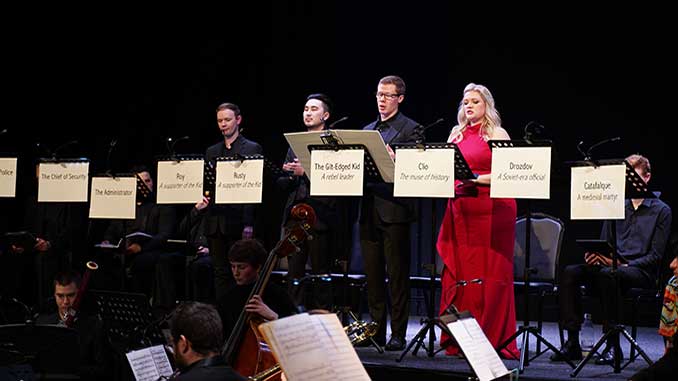 Political power, the questioning of it, the challenge for it and impacts it has on personal lives formed the basis of a small collection of works presented by Melbourne’s IOpera at the weekend.
Political power, the questioning of it, the challenge for it and impacts it has on personal lives formed the basis of a small collection of works presented by Melbourne’s IOpera at the weekend.
In what was a cleverly curated program over two days on Saturday afternoon and Sunday morning at Melbourne’s Athenaeum Theatre II, a rare mini-operafest of sorts introduced two neglected one-act operas and three chamber music works, each linked by their composers being affected by the rising power of the Nazi regime. The results were mixed.
For George Dreyfus’ The Gilt-Edged Kid, it has been a long time in between performances. Commissioned in 1969 by Australian Opera (nowadays Opera Australia), it finally got the concert treatment it needed in order to get a taste of this work more than 50 years on.
Failing to be produced for the stage by Australian Opera, Dreyfus’ persistence for justice for this 80-minute political satire comes with some degree of baggage. Marking his 95th birthday, this concert performance, in the composer’s presence before an audience of almost 150, perhaps went a little way in remedying the bitterness and allowing an alternative path. But it still has a long way to go.
Unfortunately, Saturday’s performance failed to raise from the score requisite comprehension of the sung text. Written for 10 voices, with often rapid succession of lines from one character to the next, the sense that Lynne Strahan’s libretto contains much in nuance and wit was present but simply not conveyed.
Based on a fantastical homegrown leadership challenge between a rebel leader, The Gilt-Edged Kid (Lyndon Green) and incumbent leader, The Administrator (Christopher Hillier) a farcical contest is arranged involving a board game, singing, gambling, woodchopping and archery.
The Kid is victorious but dies by a misfired arrow from The Administrator who is subsequently charged with manslaughter but shot by the Chief of Police – power struggles are always ugly.
And if there was any doubt as to what persuasion these contestants leant towards, screen images of former PM Scott Morrison and Cuban revolutionary Fidel Castro signalled an association.
Dreyfus’ score translates as a restless, mood-swinging, eclectic music spiced with a sense of confident experimentalism but invariably lacking centrality – multiple ideas eddied below in competition with the vocal lines above in this reduced form for 8 musicians conducted by Warwick Stengards.
Amongst roles that include the muse of history (Lee Abrahmsen) who passes a conclusive judgment, a French revolutionary (Peter Tregear), a medieval martyr (Rebecca Rashleigh) and Soviet-era official (Nicholas Beecher) – figures from the past who interrupt proceedings with their own agenda – it was Hillier who reigned in performance stature, effortlessly channelling authority with great gusto and conviction.
Green stepped in at the eleventh hour to give a gallant performance in the title role, sporting his charmingly textured tenor but often sounded underpowered.
If The Gilt-Edged Kid is to be judged more fairly as opera with theatrical life, the benefits of insightful direction, context and improved rehearsal may very well paint a smoother picture.
It was a different story Sunday morning. A quirky, suspenseful 25-minute work making its Australian premiere, Ernst Krenek’s Der Diktator (The Director) from 1928 was both vivid, thought-provoking and immediate in its appeal.
Sung in German with English translation, Der Diktator tells the story of an assassination attempt on a fascist dictator by a young woman, Maria, whose husband, was blinded by injuries of war. But Maria falls for The Dictator’s outpouring of love for her as his wife Charlotte secretly watches on. Enraged, the wife takes the gun to shoot her husband but Maria rushes to take the bullet. This wild little tornado of an opera packs a fabulous punch.
Christopher Hillier returned as The Dictator in a role he commanded and soared in, demonstrating once again how suitably outstanding he is in such roles – recent appearances include his deftly unified authoritative roles Aeneas and Emperor Overall in IOpera’s double bill last November.
Together with Hillier, local experienced and expert talent combined to make this tautly composed work a great success. Lee Abrahmsen (Maria), Esther Counsel (Charlotte) and Robert Macfarlane (The Officer) mined much from the text in this concert presentation and its similarly eclectic but arabesque musical style received a fluid and powerful coat under Stengards’ baton and his 13 musicians.
Three short chamber works preceded Krenek’s thrilling Swiss resort-set, one-acter – Karl Rankl’s warm and delightfully phrased Ser bewegt from String Quartet (1936), Erwin Schulhoff’s Duo for Violin and Cello (1925) and Georg Tintner’s The Ellipse (1954-59) – a 5-part string quartet with vocals interpreted boldly by powerful range-spanning soprano Teresa Ingrilli.
Displaced by the prevailing political climate and affecting their lives profoundly thereon, the works of all three composers offered a small window into their souls. Schulhoff’s Duo for Violin and Cello proved to be a particularly engrossing and atmospheric work of many colours and varying energies, played with superlative bow work and commitment by Anne Harvey (violin) and Rohan de Korte (cello).
IOpera are to be commended for this winter weekend adventure with little known but impactful works. Best of all, it turns out, The Gilt-Edged Kid and Der Diktator are being pencilled in to be fully staged in November, funds permitting. Perhaps this weekend should be treated as a rehearsal and only November will truly indicate how this pair shape up as theatre.
The Gilt-Edged Kid | Der Diktator
Athenaeum Theatre II, 188 Collins Street, Melbourne
Performances: 22 & 23 July 2023
Information: www.iopera.com.au
Image: The Gilt-Edged Kid – courtesy of IOpera
Review: Paul Selar
